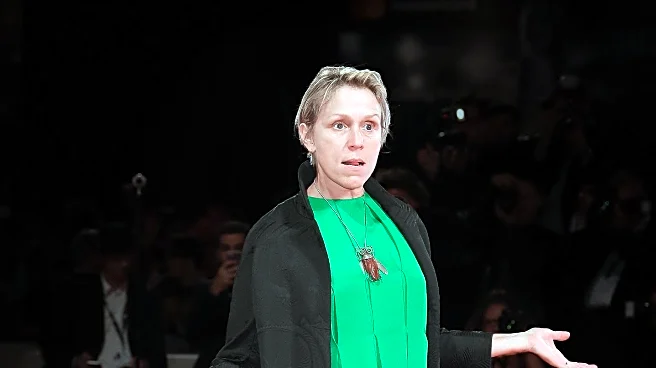What's Happening?
Chloë Sevigny made a striking appearance at the 2025 Venice Film Festival, wearing a black lace catsuit by Saint Laurent. The outfit featured biker shorts, a staple of athleisure fashion, and a voluminous bubble hem, showcasing a blend of bold design and sustainability. The lace catsuit included botanical inspirations with ornately designed florals, aligning with the dark glamour style popular in 2025. Sevigny's look was reminiscent of Demi Moore's 1989 Oscars appearance, which featured similar activewear elements. The biker shorts have gained mainstream popularity, influenced by figures like Princess Diana, and have been incorporated into high fashion by brands such as Fendi and Stella McCartney. Sevigny accessorized her outfit with dive mules in silk satin and jewelry from Tiffany & Co., further elevating her red carpet presence.
Why It's Important?
Sevigny's choice of attire highlights the growing trend of sustainable fashion, where designers and consumers are increasingly seeking alternatives to traditional fast fashion. The inclusion of biker shorts, a symbol of athleisure, reflects a shift towards more versatile and eco-friendly clothing options. This trend is significant as it promotes environmental consciousness within the fashion industry, encouraging the use of innovative materials and design practices. The popularity of sustainable fashion can lead to reduced textile waste and foster creativity, benefiting both the environment and the economy. As more celebrities embrace sustainable fashion, it can influence public perception and drive demand for eco-friendly apparel.
What's Next?
The continued rise of sustainable fashion is likely to influence future red carpet events, with more designers incorporating eco-friendly elements into their collections. This trend may also lead to increased collaboration between fashion brands and environmental organizations, aiming to promote sustainability within the industry. As consumer demand for sustainable fashion grows, companies may invest in research and development to create innovative materials and designs that align with eco-friendly practices. The fashion industry could see a shift towards more ethical production methods, impacting global supply chains and encouraging fair trade practices.
Beyond the Headlines
The movement towards sustainable fashion also raises ethical considerations regarding labor practices and the environmental impact of clothing production. As designers and brands prioritize sustainability, there may be increased scrutiny on the sourcing of materials and the treatment of workers within the industry. This shift could lead to greater transparency and accountability, fostering a culture of responsibility and ethical consumption. Additionally, the trend towards sustainable fashion may influence cultural perceptions of luxury, redefining what is considered fashionable and desirable in a more environmentally conscious world.











